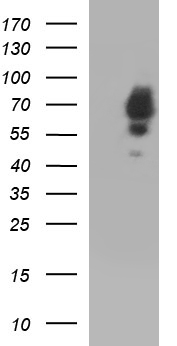Sterol carrier protein 2 (SCP2) Mouse Monoclonal Antibody [Clone ID: OTI1E4]
CAT#: CF507247
Carrier-free (BSA/glycerol-free) SCP2 mouse monoclonal antibody, clone OTI1E4 (formerly 1E4)
Formulation: Standard
Other products for "SCP2"
Specifications
| Product Data | |
| Clone Name | OTI1E4 |
| Applications | IHC, WB |
| Recommended Dilution | WB 1:4000, IHC 1:150 |
| Reactivities | Human, Mouse, Rat |
| Host | Mouse |
| Isotype | IgG1 |
| Clonality | Monoclonal |
| Immunogen | Full length human recombinant protein of human SCP2(NP_002970) produced in HEK293T cell. |
| Formulation | Lyophilized powder (original buffer 1X PBS, pH 7.3, 8% trehalose) |
| Reconstitution Method | For reconstitution, we recommend adding 100uL distilled water to a final antibody concentration of about 1 mg/mL. To use this carrier-free antibody for conjugation experiment, we strongly recommend performing another round of desalting process. (OriGene recommends Zeba Spin Desalting Columns, 7KMWCO from Thermo Scientific) |
| Purification | Purified from mouse ascites fluids or tissue culture supernatant by affinity chromatography (protein A/G) |
| Conjugation | Unconjugated |
| Storage | Store at -20°C as received. |
| Stability | Stable for 12 months from date of receipt. |
| Predicted Protein Size | 58.8 kDa |
| Gene Name | Homo sapiens sterol carrier protein 2 (SCP2), transcript variant 1, mRNA. |
| Database Link | |
| Background | This gene encodes two proteins: sterol carrier protein X (SCPx) and sterol carrier protein 2 (SCP2), as a result of transcription initiation from 2 independently regulated promoters. The transcript initiated from the proximal promoter encodes the longer SCPx protein, and the transcript initiated from the distal promoter encodes the shorter SCP2 protein, with the 2 proteins sharing a common C-terminus. Evidence suggests that the SCPx protein is a peroxisome-associated thiolase that is involved in the oxidation of branched chain fatty acids, while the SCP2 protein is thought to be an intracellular lipid transfer protein. This gene is highly expressed in organs involved in lipid metabolism, and may play a role in Zellweger syndrome, in which cells are deficient in peroxisomes and have impaired bile acid synthesis. Alternative splicing of this gene produces multiple transcript variants, some encoding different isoforms. [provided by RefSeq, Aug 2010] |
| Synonyms | NLTP; NSL-TP; SCP-2; SCP-CHI; SCP-X; SCPX |
| Reference Data | |
| Protein Pathways | Metabolic pathways, PPAR signaling pathway, Primary bile acid biosynthesis |
Documents
| Product Manuals |
| FAQs |
Resources
| Antibody Resources |
{0} Product Review(s)
0 Product Review(s)
Submit review
Be the first one to submit a review
Product Citations
*Delivery time may vary from web posted schedule. Occasional delays may occur due to unforeseen
complexities in the preparation of your product. International customers may expect an additional 1-2 weeks
in shipping.






























































































































































































































































 Germany
Germany
 Japan
Japan
 United Kingdom
United Kingdom
 China
China







